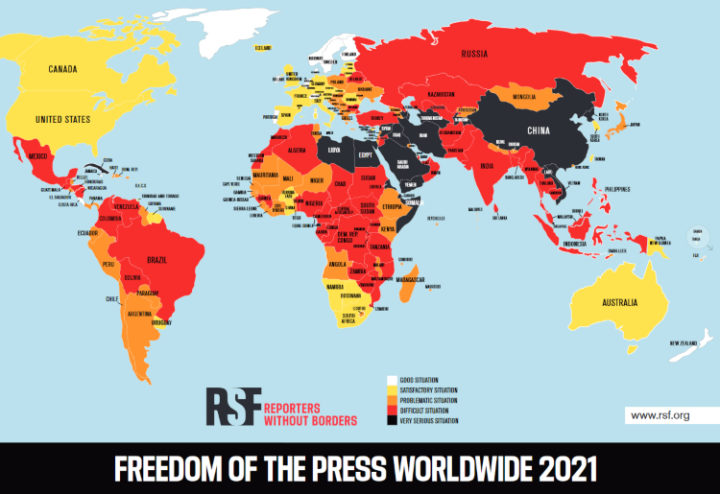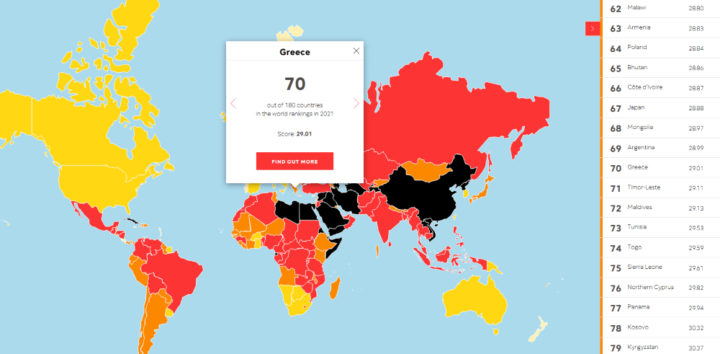The World Press Freedom Index 2021 published by Reporters without Borders (RSF) shows that journalism, “the basic vaccine against misinformation”, is being blocked completely or in part in 73% of the 180 countries which the organization monitors.
This year’s Index, which annually assesses the state of press freedom in 180 countries, shows that journalism is being completely or seriously hampered in 73 countries and is restricted in 59 others, which together represent 73% of the countries being surveyed. These countries have a “very bad”, “bad” or “problematic” environment for press freedom and are denoted in black, red or orange respectively on the Worldwide Freedom of the Press chart. Greece is in 70th position for 2020, five places lower than last year and is characterized as being in a “problematic condition”.
According to the RSF, the indications of the index reflect the dramatic deterioration of the access of citizens to information and the increase in obstacles to covering the news. The Coronavirus pandemic has been used as the excuse to hinder the access of journalists to sources of information and in the revelation of facts. Will this access be restored when the pandemic is over? Indications show that journalists have even more difficulty researching and transmitting sensitive news, especially in Asia, the Middle East and Europe.
‘Journalism is the best vaccine against misinformation’ stated Christophe Deloire, General Secretary of RSF. ‘Unfortunately, its production and dissemination are often hindered by political, economic, technological and sometimes even cultural factors. As an answer to the widespread dissemination of misinformation across borders, on digital platforms and through social media, journalism provides the most effective way to ensure that public debate is based on a broad spectrum of facts.’
Europe and the Americas (North, Central and South) continue to be the most favorable continents for press freedom, even though the United States recorded the biggest regional worsening of violations (a 2.5% increase). Europe marked an important worsening on the ‘abuse’ chart with acts of violence more than doubling in the European Union and the Balkans, in comparison to a 17% deterioration globally. Attacks on journalists and arbitrary arrests increased in Germany (13th place), France (34th), Italy (41st) Poland (2 places down, 64th), Greece (5 places down, 70th), Serbia (93rd) and Bulgaria (1 place down, 112th).
Greece: A dangerous cocktail for press freedom
The report notes the deterioration of press freedom in Greece in 2020, falling 5 places from last year in global rankings. The Conservative government under the leadership of Prime Minister Kyriakos Mitsotakis granted generous tax breaks to media advertising but has sought, directly or indirectly, to control the flow of information closely as part of its attempts to tackle both the pandemic and the refugee crisis. Investigative media and media outlets that were critical of the government were either omitted or took a disproportionately smaller share of advertising worth €20 million included in a public information campaign on the Coronavirus.
Journalists had to get permission from the government before reporting on hospitals, while the Health Ministry has forbidden medical personnel to talk to the media. In February 2021, the public television channels were ordered not to transmit a video that was circulating on social media showing the prime minister ignoring quarantine restrictions.
The police resorted to violence and to arbitrary bans in order to prevent the uncovering of the refugee crisis on the islands. In Lesbos, journalists were banned from disclosing the consequences of the fire at the Moria refugee camp, while a group of Germans was briefly detained for trying to cover the arrival of new immigrants. In Samos, a German crew was held without charge and mistreated by the police. ERT, the Greek public television, which is directly controlled by the prime minister, even though the Council of State ruled that such a thing was unconstitutional, censored reports on the new immigrant and refugee camps.
In Athens, police stopped photo reporters from covering an event in late 2020 and attacked a journalist for alleged violation of pandemic restrictions, briefly arresting him. There are concerns about the new rules on policing demonstrations since they restrict the areas where the press can be present. In April 2021, the Greek journalist community was shocked by the murder of the journalist and police researcher, Yorgos Karaivas.
The RSF global index – the measure of the level of freedom of the press worldwide – is just 0.3% lower in 2021 in comparison to 2020. However, the relative stability of the past year should not deflect attention from the fact that it has deteriorated by 12% since the index was created in 2013.
Relevant Articles:
Journalists: What the mainstream media portrays is not journalism
Journalism and the culture of inequality
The 2020 Press Freedom Awards from Reporters Without Borders
State of Emergency for Press Freedom in Europe
Translation by Jeannette A. Arduino, from the voluntary Pressenza translation team. We are looking for volunteers!











